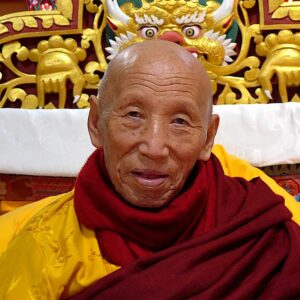By Nina Eder
When I first heard Phakchok Rinpoche talking about reflecting on our mind, I didn’t think that “checking myself” would be of any use. However, when I made it a habit, it became clearer to me what Rinpoche meant and how crucial it is.
As someone who doesn’t have any knowledge of the Tibetan culture, language or Buddhist philosophy, reflection on the important points has been very useful for me. It is easy to lose myself in the many details of this tradition and thinking that I am an amazing person because I managed to visualize the head of a deity or because I now know that the Sanskrit term “dukkha” doesn’t necessarily mean “suffering”. This is probably just me though. It is quite clear how checking myself, my motivation and the state of my mind can help overcoming issues like these.
How I Reflect
When I reflect, I start by trying not to judge myself too much. This seems obvious, but my mind is very tricky when it comes to this. The advice that has helped me most is to be compassionate to my ego-clinging. When I try to be kind to everyone except myself, it never ends well. However, when I look at myself and everyone else with compassion, I see that my mind becomes softer.
For me, sitting down in a quiet place and taking time is best when reflecting. When there are too many distractions around, I can only concentrate on a very shallow level, but I don’t see the hidden corners of my mind.
The hardest part is to be honest. I sometimes ask myself “What’s the point in deceiving myself when I want to improve?” When I see something negative, I try to be glad that I can be so honest to see the negativity in the first place (funny how you can change your perception by just looking at negativity from a different side). Without noticing negativity in the first place, how could I change?
I start by reflecting on my responsibilities for the day. I have parents, friends and things to take care of in daily life. When I see that I need to text friends or call my mum, I do it right away. When it’s less urgent things, I just remember to do them later.
Then I think about my actions in the last 24 hours and I ask myself if I made any mistakes. Sometimes, I said things that probably hurt someone without me being aware of it in that moment. Or I judged myself too much and couldn’t let go of it for a whole day. I try not to judge myself (wouldn’t make any sense after all, right?), just notice these things and remember them for the next time.
Also, at this point it’s quite good to also see what I did well, what improvements I saw. However, I try to reflect both the negative and the positive things with kindness towards myself, but at the same time without too much pride (easier said than done).
After that, I check on my practice of loving-kindness and bodhicitta. This is tricky, because I know that I want to be compassionate, but my ego is sneaking in. At first, I look at my current state of mind, seeing how compassionate I am in that very moment. Then I try to arise loving kindness and bodhicitta, check how the state of my mind changes and see if it is pure (when I don’t even know what pure bodhicitta should look like, I just look at the realized masters).
Being honest is always hard, but for compassion and bodhicitta, it is so important. Being truly altruistic is the indispensable base for all practices in Mahayana Buddhism, so this point is something that I try to check very carefully. For this point, I try to be especially gentle with my mind. I bring up compassion for my own ego-clinging that is equally in Samsara as all the other sentient beings.
Buddhism has so many practices for enhancing loving kindness and compassion, so I always get reminded of practicing them when I see my egoistic wannabe-compassion. “It doesn’t matter what you do, when it is suffused with bodhicitta, it’s going to be good.” Seems like this is really true.
After bodhicitta, I reflect on devotion and kindness. The Buddha taught the Dharma, which so many great masters and practitioners preserved it in a genuine way. Today, I have the opportunity to receive them. Do I really appreciate these teachings, my teachers and the people that have helped me?
Then I reflect on the four mind-changings, just to remind myself of them. The first one, the precious human life, logically follows the previous point, the kindness of the teachers. Next, I think about impermanence, cause and effect and the faults of samsara.
For the faults of samsara, I reflect on the five poisons: anger, jealousy, pride, attachment and ignorance. I go through each one and try to be very honest to myself. When I see that the five poisons are there in that very moment, I admit it to myself.
Checking myself is good in order to practice balancing these negative emotions with their antidotes so that I can keep this up in daily life as well. Also, maintaining a sense of playfulness keeps the mind entertained and it’s easier to stick to the practice.
At the end, I check how my meditation and practice are going.
The Benefits of Reflection
Through looking at my mind, I try to get a feeling for how it works. In daily life, I chase so much after outer appearances that I forget to stop and look. Reflecting, however, creates the habit to do exactly that. Like this, I begin to see what I have to work on and what “taming my mind” really means. Checking myself makes it clearer what I still should work on, but also, what changes I can already see.
Reflection can be a good base for change because it’s very down-to-earth and a way to notice mistakes. To practice watching my mind in these reflection exercises helps me notice emotions more easily in day-to-day life as well. Reflection is also a good reminder of the important points like love and compassion, humility, decisiveness and devotion, which, at least for me, is very important.
Nina Eder is a part time student living in Austria. Her favorite things to do are drinking tea and being around people who genuinely care for others (even a piece of normal wood will take on a good smell when you put it together with sandalwood).










Responses